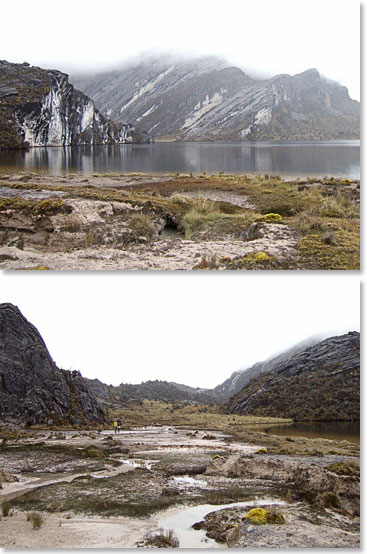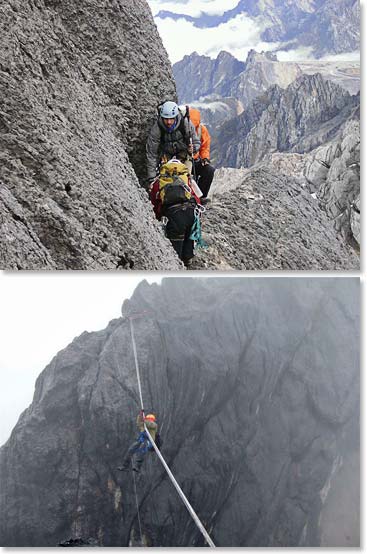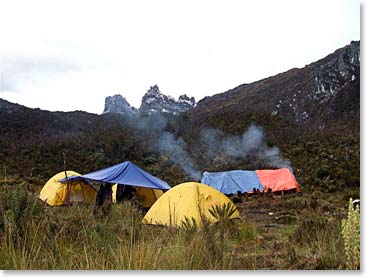
Climb the most remote of the Seven Summits with Berg Adventures
Carstensz Pyramid – Trip FAQ
Here is where you will find answers to some of your questions about this expedition. If you do not find what you need here, please contact us at info@bergadventures.com.
Choose the specific question to link to your answer
- How do I get to Papua?
- What is the weather like in Papua?
- What kind of mountaineering experience do I need for this climb?
- What kind of permits do we need and how can I obtain one?
- What kind of meals will we have on our trek?
- Can I bring food from home?
- What type of accommodations will we have during our trip?
- Do I need travel insurance?
- Where will we get our drinking water?
- How much will my pack weigh?
- What kind of vaccinations do I need for this trip?
- 1. How do I get to Papua?

- Papua, Indonesia (formally Irian Jaya) is the Indonesia half of the island of New Guinea. Papua is the easternmost province of Indonesia. Many people do not know that Indonesia is the 4th largest country in the world by population and one of the largest in terms of land mass as well; it contains 17,700 islands and it spans more than 5000 kilometers (3200 miles) from east to west. Travelling from outside Indonesia you will be required to enter the county at either the capitol, Jakarta, or at Denpasar (Bali). Flights arrive in Jakarta from most major Asian airports and directly from several locations in North America and Europe. It is possible to fly directly to Bali from international destinations as well.
- 2. What is the weather like in Papua?

- You will be just slightly south of the Equator for the entire trip. It does not rain all the time in equatorial New Guinea, but it does rain at least a bit almost every day. At lower elevations it can be hot, into the 90s °F (33 °C), but as we climb to the highlands daytime temperatures drop to a maximum of 60 °F (16 °C). Overnight lows at Base Camp will be just above freezing and it is not uncommon to have snow at the highest elevations on summit day, although rain on summit day is more common.
- 3. What kind of mountaineering experience do I need for this climb?

- Summit day is a long, but easy to moderate rock climb. The climbing on Carstensz is enjoyable, very solid limestone and most of the summit route is 3rd and 4th class climbing difficulty. You will not need to ascend difficult pitches but you should know how to move confidently and in balance on easy rock terrain. At the most difficult sections you will need to be comfortable using mechanical ascenders and you should be confident and self-reliant with rappelling skills.
- 4. What kind of permits do we need and how can I obtain one?

- You will need to obtain a normal 30-day visiting visa for Indonesia upon arrival at Jakarta or Denpasar, Bali. You will be required to show that your passport is valid for at least 6 months after your arrival and it is required that you have at least two blank passport pages. Please do not obtain an Indonesian visa in advance of your arrival at Bali or Jakarta. Indonesia consulate offices sometimes issue visas in advance that restrict the areas where you can travel. You will be fine with the normal entrance visa issued at the airport when you arrive and this is what we recommend.
- 5. What kind of meals will we have on our trek?

- You will be served hot meals every morning and evening and will hike with a lunch box that is prepared in the morning and given to you before we begin hiking. Food we serve includes pasta, rice, soups, eggs, cheese, fresh vegetables dried meats, canned tuna, tomato sauce, dry cereal, pancakes, peanut butter, margarine, instant mashed potatoes, instant pudding and canned fruit. Trail food includes chocolate bars, trail mix, crackers, cheese, salami and nuts. There will be drink mixes for flavoring water as well as black and herbal teas and lots of coffee. If you have dietary restrictions or special requests please inform us in advance and we will accommodate you.
- 6. Can I bring food from home?

- Weight is limited. You will be allowed 17 kilos for your personal porter to carry and your own rucksack should be kept as light as possible. We prefer that you inform us of special snack foods that you like and we will try to include them with the group food.
- 7. What type of accommodations will we have during our trip?

- Mostly in tents during our expedition. The exceptions are; in Bali where we will be in a hotel and Timaka where you will also be in a hotel if we are required to stay there. We sometimes stay for one night in huts which are run for guests at Illaga or Sugapa, but these are simple dormitory style shelters, toilets are outside and there are no private rooms.
- 8. Do I need travel insurance?

- Travelers insurance is highly recommended for this trip. Please contact our office for suggestions and details.
- 9. Where will we get our drinking water?

- Staff will provide unlimited quantities of good drinking water that has been filtered and purified at our camps. You will leave for each days hike with this water in your Nalgene bottles and it will be waiting when you arrive at camp. When you are on route to Bali we recommend that you travel with “Potable Agua” water purification tablets or drink bottled water. Filters clog easily with the sediment that is present in water in New Guinea; tablets are much better.
- 10. How much will my pack weigh?

- We recommend that you carry a 30 – 40 liter Alpine style rucksack as your daypack for the trek and climb and that you not fill it too full! Porters will carry all group camping supplies, fuel, food and your personal camping equipment. Your day pack should weigh about 20 pounds (9 kilograms).
- 11. What kind of vaccinations do I need for this trip?

- None are required for entry to Indonesia. You should start a course of Malaria prophylaxis that is recommended by your travel clinic; Malarone will be suggested for most travelers. In your trip information packet, which will be sent to you by mail after you sign up, we will send a complete list of recommended travel medications for you to carry as well as a list of supplies that we keep in our medical kit.

Climbers should be prepared for it to rain at least once a day during their expedition. Rubber boots are a MUST,

Rock climbing on Carstensz gives climbers great mountaineering experience!

We will spend most of our evenings in tents along the river or in the high passes of the mountain.

